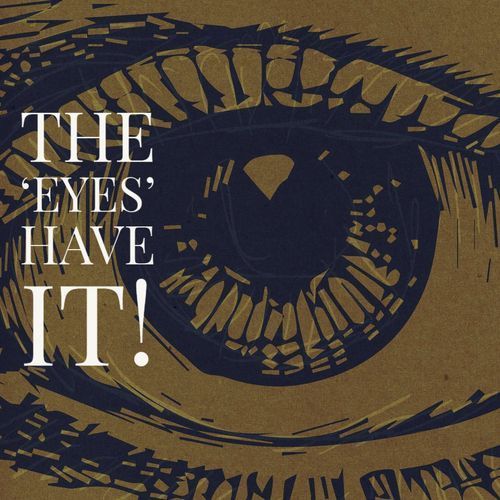THE 'EYES' HAVE IT!

Scripture:Genesis 29:16-18 - And Laban had two daughters: the name of the elder was Leah, and the name of the younger was Rachel. Leah was tender eyed, but Rachel was beautiful and well favoured. And Jacob loved Rachel, and said 'I will serve thee [Laban]seven years for Rachel thy younger daughter."
It has been stated, even sung about, how 'beauty is only skin deep' [yeah, yeah, yeah!]. And we've heard how you can't judge a book by its cover. These remind us that beauty, as well as blessing may not always be of the obvious. After all, it is the red of the apple which captures us, yet it's the inward apple that feeds. We might consider the ends of a good sports season to be the winner's trophy, only to later reflect on the value of many tough practices where you learn more about yourself and others, where the deeper things of respect and friendship develop from. You learn of the power of cooperation, and the place for appreciating good leadership that prompts commitment. You come to know that this life as a platform endorses the greatest gain through somebody's strain.
It seems apparent that Jacob was absolutely smitten with Rachel from the start, and was not so bashful about it. The Bible illustrates for us a Rachel who is stunning [even while tending sheep], who is 'well-favoured', which is vague but distinctly good. In contrast, we have Leah, whose name means 'weary', which as a given name implies that even in infancy something about the baby was not so applaudable, or perhaps the birth was difficult. Rachel was Laban's 'baby girl', and the object of Jacob's passion. Leah was the older daughter, who was less loved by Jacob than Rachel[Genesis 29:30]. Both became wives. And while Leah was not directly described as ugly, compared with Rachel's overflowing beauty, one would conclude that she at the least was plain, with eyes which were likewise unimpressive, weak. Further, into their stories, we find Leah to be the fertile one, however, without the love, her conceiving was most likely the result of Jacob's obligation as her husband, much like tending to an undesirable job. In Genesis 29:31 we note that Leah was hated. With all this said, by some Jewish accounts it is Leah, not Rachel, who is considered godly, with God 'hearing her' [prayers], and subsequently her praise. Each son named by her has a name that implies praise of God.
Her praying so vigorously, and being so diligent allows her the distinction of being the fourth and last matriarch in the Jewish Bible, being noted as a prayer warrior, and a model of thanksgiving. Some would say that her weak eyes were the result of many tears, yet she held on, while in the shadow of her younger sister. She held on with the strength of knowing God as merciful and gracious, even when circumstances were hard. At the end of life, it was Leah, not Rachel, that was buried with Jacob in the cave of the Patriarchs, regarded as the head of his household. Her legacy, not so romanticized, and easy to underestimate: kings and priests, with Judah, Levi, Moses, Miriam, Aaron, David, Solomon, and Hezekiah to note... she was the biological mother of six of the twelve tribes of Israel, with Jesus as well being a part of that lineage[Matthew 1:1,2].
Through her legacy, with Jacob, 'in thee and in thy seed shall all of the families of the earth be blessed' is part of the fulfilled promise. [Genesis 28:13,14]
When we know that God can do anything, we can lift up the impossible, and while waiting, be grateful. Bless you, Leah, for your faithful example, and your quiet, radical hope.
Prayer: Thank you LORD, for your faithfulness and loving kindness to show yourself and how you are, and that you care, and how you bless outside of the limelight those whose private and personal prayers, carry such a reach that many of us may not ever know. Some have been in our lives, while others are present now, and for the future, we cannot see, there comes that stranger that will become a friend, that brother or sister in the faith that shall matter so much, as indeed you've no shortage of your own angels to touch us while in our trouble, even when that trouble is of our own bringing. Thank you so much for the blessings of then, now, and yet, all beneath your hand. Glory, Hallelujah, and Amen!
(by Dr. McNeal Brockington)
It has been stated, even sung about, how 'beauty is only skin deep' [yeah, yeah, yeah!]. And we've heard how you can't judge a book by its cover. These remind us that beauty, as well as blessing may not always be of the obvious. After all, it is the red of the apple which captures us, yet it's the inward apple that feeds. We might consider the ends of a good sports season to be the winner's trophy, only to later reflect on the value of many tough practices where you learn more about yourself and others, where the deeper things of respect and friendship develop from. You learn of the power of cooperation, and the place for appreciating good leadership that prompts commitment. You come to know that this life as a platform endorses the greatest gain through somebody's strain.
It seems apparent that Jacob was absolutely smitten with Rachel from the start, and was not so bashful about it. The Bible illustrates for us a Rachel who is stunning [even while tending sheep], who is 'well-favoured', which is vague but distinctly good. In contrast, we have Leah, whose name means 'weary', which as a given name implies that even in infancy something about the baby was not so applaudable, or perhaps the birth was difficult. Rachel was Laban's 'baby girl', and the object of Jacob's passion. Leah was the older daughter, who was less loved by Jacob than Rachel[Genesis 29:30]. Both became wives. And while Leah was not directly described as ugly, compared with Rachel's overflowing beauty, one would conclude that she at the least was plain, with eyes which were likewise unimpressive, weak. Further, into their stories, we find Leah to be the fertile one, however, without the love, her conceiving was most likely the result of Jacob's obligation as her husband, much like tending to an undesirable job. In Genesis 29:31 we note that Leah was hated. With all this said, by some Jewish accounts it is Leah, not Rachel, who is considered godly, with God 'hearing her' [prayers], and subsequently her praise. Each son named by her has a name that implies praise of God.
Her praying so vigorously, and being so diligent allows her the distinction of being the fourth and last matriarch in the Jewish Bible, being noted as a prayer warrior, and a model of thanksgiving. Some would say that her weak eyes were the result of many tears, yet she held on, while in the shadow of her younger sister. She held on with the strength of knowing God as merciful and gracious, even when circumstances were hard. At the end of life, it was Leah, not Rachel, that was buried with Jacob in the cave of the Patriarchs, regarded as the head of his household. Her legacy, not so romanticized, and easy to underestimate: kings and priests, with Judah, Levi, Moses, Miriam, Aaron, David, Solomon, and Hezekiah to note... she was the biological mother of six of the twelve tribes of Israel, with Jesus as well being a part of that lineage[Matthew 1:1,2].
Through her legacy, with Jacob, 'in thee and in thy seed shall all of the families of the earth be blessed' is part of the fulfilled promise. [Genesis 28:13,14]
When we know that God can do anything, we can lift up the impossible, and while waiting, be grateful. Bless you, Leah, for your faithful example, and your quiet, radical hope.
Prayer: Thank you LORD, for your faithfulness and loving kindness to show yourself and how you are, and that you care, and how you bless outside of the limelight those whose private and personal prayers, carry such a reach that many of us may not ever know. Some have been in our lives, while others are present now, and for the future, we cannot see, there comes that stranger that will become a friend, that brother or sister in the faith that shall matter so much, as indeed you've no shortage of your own angels to touch us while in our trouble, even when that trouble is of our own bringing. Thank you so much for the blessings of then, now, and yet, all beneath your hand. Glory, Hallelujah, and Amen!
(by Dr. McNeal Brockington)
Archive
2026
January
"BE PREPARED" and "DO A GOOD TURN DAILY"The Devil Subtly Rocks Me to SleepUNBELIEVEABLESUNDAY MORNING PRAYERS WITH Pastor Wayne CockrellAsk for DirectionNew Year, Same GodGiving and ReceivingWhom Might the 'Me' Be?CAUGHT Off GODAre You Sure, Lord, This is For Me?SUNDAY MORNING PRAYERS with Pastor Wayne CockrellOh, the King IS ReturningOur Joy is God’s GloryCaught Off GOD – Part 2Thinking Like JesusThe Cage MatchWeight Loss Goals for 2026SUNDAY MORNING PRAYERS with Pastor Wayne CockrellPEACE: A CallingUse Me Lord, Even MeDon’t Miss JesusA Revival for SurvivalA BIRDS-EYE VIEW, AND BEYONDThe Choice Is YoursSUNDAY MORNING PRAYERS with Pastor Wayne CockrellThe God-Man GlorifiedEvil Is Not InvitedOpen and ReadGOD: 'BIG' ENOUGH FOR ALL, 'SMALL' ENOUGH FOR METhe Ungrateful HeartWe are the Lord’s
February
SUNDAY MORNING PRAYERS with Pastor Wayne CockrellTAKE THIS PERSONALLYSHARPEN THE EDGEExercising My FaithTake Me Back, LordTis So Sweet to Trust in JesusNo One is Greater than JesusSUNDAY MORNING PRAYERS with Pastor Wayne CockrellACHIEVERS For HIS GloryStewards of Our MarriageSharpen The Edge {Again}Set-Up for a MiracleOur AimA Valentine's Day Card to Our Heavenly GroomSUNDAY MORNING PRAYERS with Pastor Wayne CockrellSPIRITUAL ERsBehind the Closed DoorSHARPEN THE EDGE pt 3No Room for Discrimination in the BodyA Supernatural LoveBelieve GodSUNDAY MORNING PRAYERS with Pastor Wayne CockrellSTAY FOCUSED: Run YOUR Race
2025
January
Prayer For A New Year 2025Prayer for A Heart Like Christ’sA PRAYER FOR HELP WITH OUR FAITHA Prayer of RepentanceA Prayer to Press OnPrayer For a Fragile Next GenerationPrayer For an Open HeartA Prayer For EndurancePrayer of Praise From the RedeemedPrayer For True EnlightenmentA Prayer: God is Waiting in the New YearSUNDAY MORNING PRAYERS with Pastor Wayne CockrellPrayer That Celebrates God’s WorkPrayer To See Things God’s WayPrayer of Thanks for God’s Keeping PowerPrayer When Faith is Tested: Accepting God’s WillPrayer of Dedication to Our LordA Prayer of Appreciation and WorshipSUNDAY MORNING PRAYERS with Pastor Wayne CockrellPrayer For Humble LivingPrayer for Greater Faith to Live for GodPrayer Against Our FeelingsPrayer to the ONE Who Knows All ThingsPrayer For Sight in the Midst of LossPrayer to be Better Lovers of All Kinds of PeopleSUNDAY MORNING PRAYERS with Pastor Wayne CockrellPrayer of Rekindled PraisePrayer According to Your WillPrayer for the Generations to ComePrayer For the Benefits of PrayerPrayer For a Fresh Awareness of the HOLY SPIRIT
February
The Celebration of Jerusalem’s Deliverance: The Festival of LightsSUNDAY MORNING PRAYERS WITH Pastor Wayne CockrellThe Gift of ForgivenessGreat Love Requires DisciplineFrom The 2024 Vault: We Must VoteHow Does God Love?Running Our RaceA Prayer of Thanksgiving to GodSUNDAY MORNING PRAYER with Pastor Wayne CockrellHeart to Heart with GodWill You Be Mine?Birthday Gifts for Pastor Wayne Cockrell.The Discipline of GodStop In the Name of LoveSUNDAY MORNING PRAYERS with Pastor Wayne Cockrell
Recent
STAY FOCUSED: Run YOUR Race
February 23rd, 2026
SUNDAY MORNING PRAYERS with Pastor Wayne Cockrell
February 22nd, 2026
Believe God
February 21st, 2026
A Supernatural Love
February 20th, 2026
No Room for Discrimination in the Body
February 19th, 2026
SHARPEN THE EDGE pt 3
February 18th, 2026
Behind the Closed Door
February 17th, 2026
SPIRITUAL ERs
February 16th, 2026
SUNDAY MORNING PRAYERS with Pastor Wayne Cockrell
February 15th, 2026
A Valentine's Day Card to Our Heavenly Groom
February 14th, 2026

No Comments